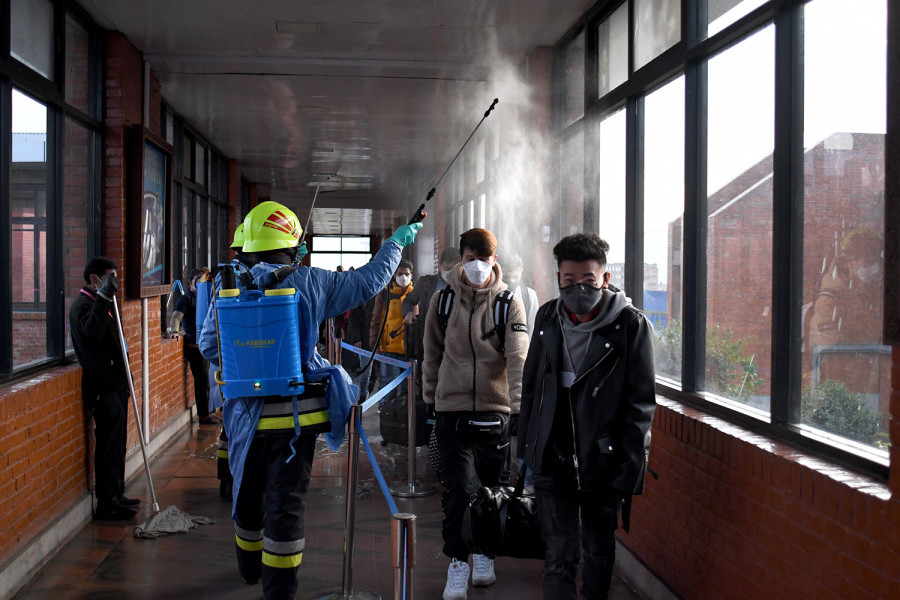Columns
Pandemic and the Nepali tourism industry
In the absence of appropriate strategies to reach new markets, Nepal faces a massive challenge.
Chandra P Bhattarai
As per the latest World Health Organisation updates from March 7, the number of confirmed cases of Covid-19 has surpassed 100,000 in 94 countries across the globe; the disease has already caused 3,486 deaths. Out of them, 80,813 cases and 3,073 deaths were reported in China alone. WHO had initially expressed its concern over the spread of the virus to countries with weaker health systems, and had advised them to remain vigilant to prevent its spread. But as the disease continues to spread the world over, Covid-19, the infectious respiratory illness, has now officially been declared a pandemic.
The sudden outbreak received a very swift response from China itself. While China acted swiftly to stop the spread of the virus, other countries were more concerned about the health of their own citizens. Big economies like the United States, Japan and India had evacuated their citizens from China immediately after the occurrence of the epidemic, others too evacuated sooner or later. Russia closed its 4,300-kilometre eastern border with China.
While the pandemic has seriously affected every aspect of the entire world economy, the global tourism industry suffers the most. Although Chinese President Xi Jinping visited Wuhan on March 10 in a show of confidence, China's isolation from the rest of the world has hit industries badly. China is not only the world's second-largest economy, but it is also a reliable source market to several tourism-dependent countries in the world, accounting for 20 percent of the total international spending. A third of the international visitors in Thailand are Chinese. A country that had received almost 11 million Chinese travellers last year is about to lose half that number in 2020. Other Asian countries to lose their share of the Chinese source market include Cambodia, Malaysia, Vietnam and Indonesia.
China has been Nepal's second-largest tourism source market over the last several years. It had fully supported Nepal's Visit Nepal Year 2020, a campaign for revitalising Nepal’s post-quake tourism industry to reassure international visitors. Nepali hospitality industry had expected some 350,000 Chinese tourists out of the total target of 2 million this special year.
Unfortunately, the situation has taken a U-turn. All flights from Kathmandu to major destinations in China, numbering 65 in a week, have been suspended. Nepal has completely lost its air connections with Beijing, Chongqing, Guiyang, Changsha, Chengdu, Guangzhou, Kunming, Lhasa and Xian. In these virus-infested times, the government’s decision to postpone Visit Nepal Year makes sense.
At the instruction of Prime Minister KP Oli to postpone the Visit Nepal 2020 campaign, the government of Nepal at this stage has also called off all programmes including international promotional activities for the campaign. However, the tourism ministry itself and concerned agencies are in a state of confusion. The authorities do not have the same voice on whether the tourism campaign is cancelled, postponed or continued. It is likely to make decisions regarding the future course of the campaign only when the Prime Minister returns to office following a kidney transplant. The fate of the Visit Nepal Year 2020’s secretariat will also be decided by then.
Much cannot be said of the impact on the global tourism industry in the short run. It will take a reasonable time for the industry to come back to its shape. UNWTO, the United Nations agency responsible for the promotion of sustainable and universally accessible tourism sector, is working closely with WHO to stop the spread of the virus and limit its impact on people and communities. It has revised its 2020 prospects for international tourist arrivals. The global tourism industry will naturally have negative growth of 1 to 3 percent against a pre-Covid-19 outbreak predicted positive growth of 3 percent to 4 percent for the year.
The case of Nepal is still more challenging. In the absence of both a clear vision of international markets and appropriate strategies to reach there, exploring new markets immediately is a big challenge. To compensate for the possible loss to its hospitality industry, all Nepal can do at the moment is take necessary precautions regarding the health, wellbeing and safety of its international guests.
***
What do you think?
Dear reader, we’d like to hear from you. We regularly publish letters to the editor on contemporary issues or direct responses to something the Post has recently published. Please send your letters to [email protected] with "Letter to the Editor" in the subject line. Please include your name, location, and a contact address so one of our editors can reach out to you.




 9.51°C Kathmandu
9.51°C Kathmandu















